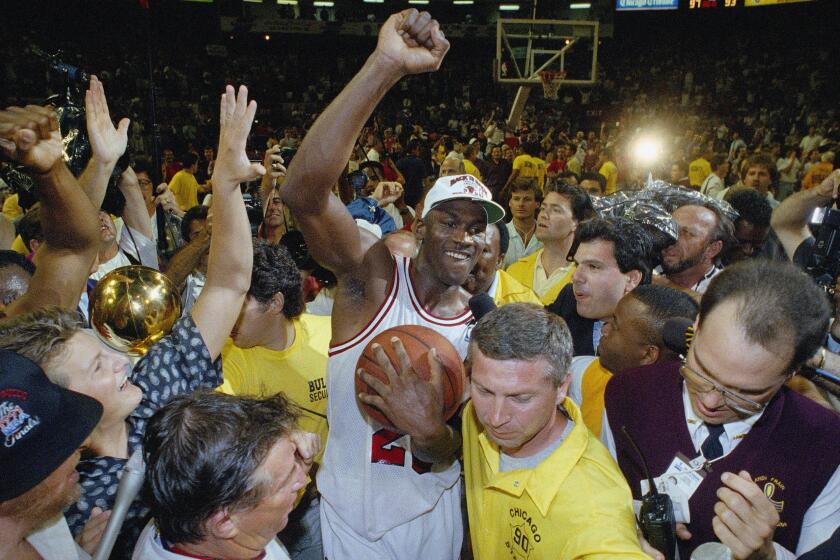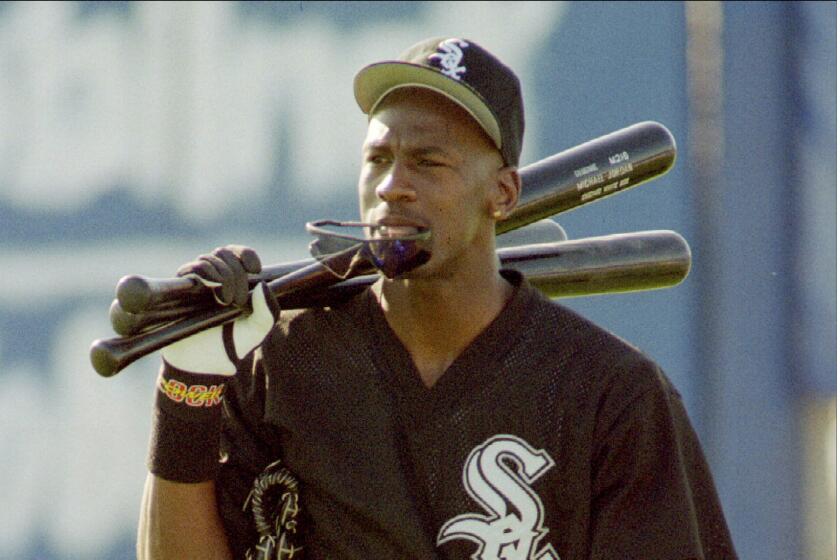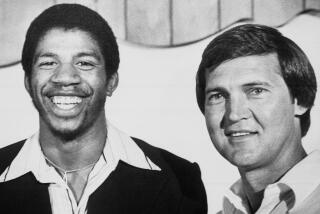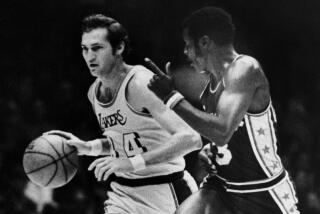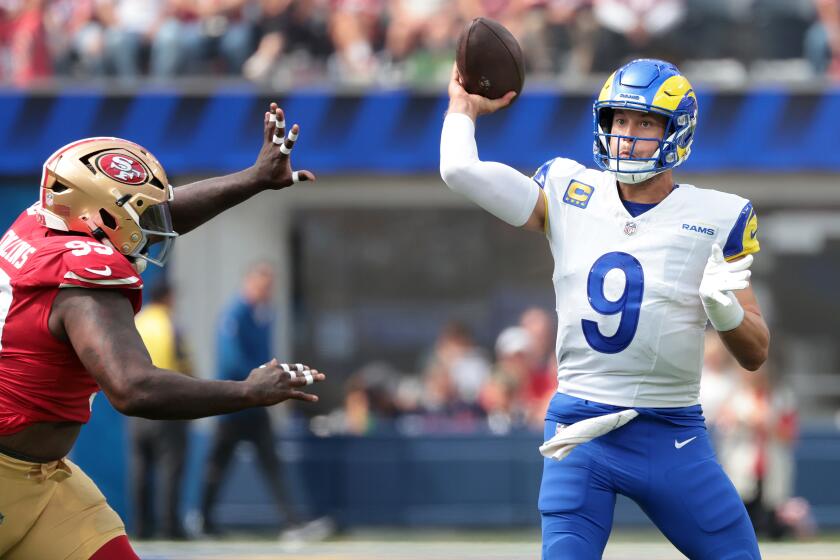‘The Last Dance’: The 23 most fascinating takeaways from Episodes 7 and 8

- Share via
Michael Jordan’s avoidance of the media spotlight since retiring, for a final time, in 2003, is why some of the most compelling scenes in “The Last Dance,” ESPN’s documentary about Jordan and the 1997-98 Chicago Bulls, come not from the long-awaited, never-seen archival footage, but from the present-day interviews with Jordan himself.
When recounting old slights, Jordan’s eyes go wide. When he laughs, they close to a slit. They bulge listening to old foes recount memories of old battles, and almost always, they flash the intensity that is the hallmark of his career — a side of Jordan explored throughout the documentary’s seventh and eighth episodes, which air Sunday.
But at key points during the two latest episodes, the eyes also show something Jordan rarely allowed others to glimpse during his career — vulnerability.
Watch his eyes, as they blink quickly to hold back tears.
Here are 23 takeaways from the seventh and eighth episodes:
1. Jordan knew “in the back of my mind” that he’d played his final game shortly after beating Phoenix in 1993 to win his third NBA championship — a feeling only he and his father knew at the time. Jordan had just finished his ninth NBA season. To put into context how stunningly young that is to walk away, consider that Clippers forward Kawhi Leonard is playing his ninth season right now.
2. Jordan didn’t always have an ultra-focused drive. Its origin came in ninth grade, when his father, James, pulled him aside after Jordan was suspended three times from school.
“‘If you want to go about doing all this mischievous stuff, you can forget sports,’” Jordan recalled his father saying. “That’s all I needed to hear. From that point on it was like tunnel vision.”
3. That “tunnel vision” — which could also be described as selective vision — led to his ultra-celebrity, of course, which could make Jordan nearly impossible to relate to. Which is why his continued discussion of his late father, calling him “my rock” and “voice of reason,” provides maybe the most revealing glimpse of Jordan in the documentary thus far.
Nodding for emphasis after calling his father his friend, Jordan tries holding back tears by blinking quickly. He bites his lower lip. If you’ve ever lost someone close to you, you know that look.
Coverage of ESPN’s “The Last Dance” series, featuring behind-the-scenes stories about Michael Jordan, the Chicago Bulls, Kobe Bryant, Carmen Electra and more.
4. The murder of Jordan’s father in 1993 led Jordan to say he hadn’t thought about basketball in August, before the ‘93-94 season, and soon after, his agent, David Falk, approached Bulls owner Jerry Reinsdorf at a charity dinner to say Jordan was considering retirement. Reinsdorf said Jordan needed to discuss it with coach Phil Jackson before deciding.
5. Meeting with Jackson one on one, Jordan said he wanted to walk away in part because he had no more challenges. That strikes me as a little surprising.
As someone who clearly knew his NBA history — he took special satisfaction in winning a third consecutive championship because it was something neither Larry Bird nor Magic Johnson accomplished — wouldn’t it seem natural for Jordan, in the moment, to want to widen the gap even further on Bird and Magic, to show who was truly the greatest? At that time, Jordan’s three titles matched Bird’s, with Magic still two titles ahead.
6. Can you imagine what it must have been like for the Chicago White Sox on Oct. 5, 1993? That day, during Game 1 of the American League Championship Series against Toronto at Comiskey Park, Reinsdorf pulled aside general manager Jerry Krause in a suite to tell him that Jordan was retiring. Then the news leaked.
The White Sox, mind you, were not only enjoying their best season in a decade but also their first playoff appearance in a decade. But when Jordan bolted out of the ballpark during the seventh inning, ahead of a pack of reporters hungry for comment on the news of his retirement, it siphoned all the attention away from baseball for the night. Maybe it was for the better, though. The Blue Jays defeated the White Sox 7-3.
7. Did you read our explainer on Jordan’s gambling last week? (If not, we’ll wait.) It was not a good look for the NBA to have the reputation of its most popular player weighed down by questions about whether he could control his betting. All of that led to a question that popped up immediately in 1993 and persists today: Was Jordan’s retirement cover for a secret suspension levied by commissioner David Stern because of Jordan’s gambling?
Stern, in the documentary, calls such a connection “folklore.”
“The urban legend that I sent him away because he was gambling, ridiculous,” Stern said. “No basis in fact.”
8. Jordan credits his father with teaching him to turn a negative into a positive, and it was that lesson that made him smile during his retirement press conference. If his career was indeed over, his father had seen it all.
“He saw my last basketball game,” Jordan said. “And that means a lot.”
9. During his last conversation with his father, Jordan said the two debated whether he should quit basketball to play baseball.
Jordan said his father told him: “Do it.”
10. Everyone in “The Last Dance” agrees: Pippen’s refusal to play during the final seconds of Game 3 of the Bulls’ 1994 playoff series against New York was out of character and cast a shadow over his good-teammate reputation. Pippen says he was insulted that Jackson drew up the final play for Toni Kukoc, not him — the sidekick who had waited his turn in Jordan’s shadow until 1994 and had become Chicago’s star.
11. Jackson reveals that Jordan called him the day after, while he was playing baseball, and told him: “‘I don’t know if Scottie’s ever going to live this down.’”
When producers of “The Last Dance” announced a new date for the series to debut, they had finished only three of the 10 episodes. The final episode still is not complete.
12. Here’s where the archival footage of the 1997-98 season makes you sit forward in your seat: The seventh episode zeroes in on Jordan’s treatment of teammates through the example of Scott Burrell, who was a fifth-year forward in 1997-98. A sampling: Jordan tells Burrell he can’t guard him, that he can’t guard even Bulls reserve Jud Buechler, and that one particular layup attempt during a practice is “garbage.”
Jordan said he picked on Burrell, whom he called “such a nice guy,” because he hoped it would create a fighting edge that could help the Bulls. But even Jackson acknowledges that he had to tell Jordan to “tone it down.”
13. Jordan doesn’t appear remorseful about such treatment. Losing the “nice guy” label was the cost of winning championships.
“When people see this they’re going to say, ‘Well, he wasn’t really a nice guy, he may have been a tyrant,’” Jordan said. “Well, that’s you. Because you never won anything.”
14. And yet, a seventh episode that begins with Jordan being overcome by emotion ends in the same fashion. It seems clear Jordan understands that for all his winning, the crucible environment he fostered — and the pain it could cause others — will remain part of his legacy forever. Holding back tears, Jordan calls for a break in taping.
15. After Washington guard LeBradford Smith scored 37 against Chicago in 1993, Jordan was so incensed by a postgame comment by Smith that he perceived as disrespectful — “Nice game, Mike”— that Jordan vowed to score 37 in the first half of the Bulls’ next meeting with Washington.
Jordan had 36 before halftime.
16. The prevailing image of Jordan, the baseball player, is of him striking out, over and over. But Jerry Reinsdorf, the owner of the Bulls and White Sox, believes Jordan would have eventually played in the major leagues had he stuck with baseball. Had the 1995 MLB strike not occurred, and Jordan continued focusing on baseball, maybe thoughts of returning to basketball don’t intrigue him. His manager in double-A Birmingham, the future Red Sox manager Terry Francona, also believed that with 1,500 at-bats, Jordan could have become a good enough hitter to warrant a call-up to the majors.
17. Jordan wrote the famous press release announcing his return to basketball in 1995: “I’m back.”
18. During his first game back in 1995, Jordan accidentally put his shorts on backward. But there were other changes that came with his comeback, too: He donned a jersey with the number 45, instead of the 23 he’d made famous. Why?
Because “I knew my father wasn’t there to watch me and I felt it was a new beginning,” Jordan said. “And 45 was my first number when I played in high school.”
19. Losing to Orlando in the second round of the 1995 playoffs, and watching former teammate Horace Grant celebrate the victory, in Chicago, “was one of Michael’s lowest points,” said friend and former broadcaster Ahmad Rashad.
Actress and former pinup Carmen Electra recalls her romance with Dennis Rodman in ESPN’s “The Last Dance,” about Michael Jordan and the Chicago Bulls.
20. Warner Bros. constructed an indoor practice facility for Jordan on its Burbank lot in the summer of 1995 to allow Jordan to train while shooting “Space Jam.” Jordan would arrive on set by 7 a.m. and receive a two-hour break to practice before finishing shooting around 7 p.m. Then, he would host pickup games at the facility dubbed the “Jordan Dome.” Jordan used games featuring Patrick Ewing, Juwan Howard, Reggie Miller and many more to scout for the upcoming season.
21. If you’re a basketball fan, then you have heard before that Jordan and Steve Kerr fought during a Bulls practice. Jordan was upset that Jackson was calling “ticky-tack” fouls during a scrimmage, believing he was protecting Kerr. Jordan then fouled Kerr hard, Kerr punched Jordan in the chest and Jordan responded with a fist to Kerr’s eye.
What we didn’t know much about before? What happened after.
“I’m in the shower and I’m saying, look I just beat up the littlest guy on the ... court, and I felt about this small,” Jordan says, holding two fingers apart by mere millimeters. He called Kerr and apologized.
22. By the 1996 season, you would think that the entire NBA knew Jordan would stop at nothing to find motivation (see No. 15). You would especially think Seattle coach George Karl, who had a relationship with Jordan through their shared ties to North Carolina and Dean Smith, would know not to poke the bear.
So, when Karl walked past Jordan without speaking to him at a restaurant on the eve of their 1996 Finals matchup, what exactly was Karl thinking would happen?
23. Sonics guard Gary Payton, one of the league’s best defenders, began guarding Jordan starting in Game 4 of the series. The Sonics won the next two games. It leads to one of the most memorable reaction shots in the entire documentary, a moment that will almost assuredly become an instant Twitter meme.
Holding a tablet in his hands, Jordan purses his lips to hold back a smile while listening to the filmmakers’ interview with Payton. Hearing Payton, a legendary trash talker during his day, say his work “beating Jordan down” altered the course of the series, Jordan cocks his head forward, his eyebrows raised and his forehead wrinkled in shock. And again, there are those eyes — bulging in what appears to be a mixture of disbelief and amusement.
Jordan resets himself in his chair and calmly offers his rebuttal.
“I had no problem with Gary Payton,” Jordan says.
While Charles Barkley might disagree, Michael Jordan likely would have developed into a major league prospect had he stuck with baseball.
More to Read
Go beyond the scoreboard
Get the latest on L.A.'s teams in the daily Sports Report newsletter.
You may occasionally receive promotional content from the Los Angeles Times.

